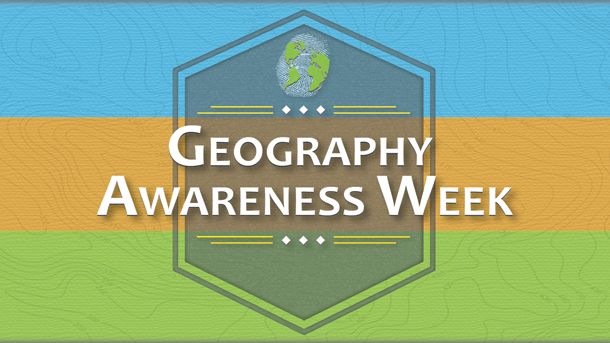About Geography Awareness Week

Program Mission and History
Too many young Americans are unable to make effective decisions, understand geo-spatial issues, or even recognize their impacts as global citizens. National Geographic created Geography Awareness Week to raise awareness to this dangerous deficiency in American education and excite people about geography as both a discipline and as a part of everyday life
Each year more than 100,000 Americans actively participate in Geography Awareness Week (GeoWeek). Established by presidential proclamation more than 25 years ago, this annual public awareness program organized by National Geographic Education Programs (NGEP) encourages citizens young and old to think and learn about the significance of place and how we affect and are affected by it. Each third week of November, students, families and community members focus on the importance of geography by hosting events; using lessons, games, and challenges in the classroom; and often meeting with policymakers and business leaders as part of that year’s activities. Geography Awareness Week is supported by year-long access to materials and resources for teachers, parents, community activists and all geographically minded global citizens
Geography Awareness Week FAQs
What is geography?
Geography is the study of places and the relationships between people and their environments. Geographers explore both the physical properties of Earth’s surface and the human societies spread across it. They also examine how human culture interacts with the natural environment and the way locations and places can have an impact on people. Geography seeks to understand where things are found, why they are there, and how they develop and change over time.
When is Geography Awareness Week?
Geography Awareness Week (GeoWeek) is celebrated every third week of November.
Does GeoWeek have a theme this year?
In the past, each year has had a theme that explores a specific aspect of geography. From now on each year will have a slogan celebrating a facet of geography, but participants in GeoWeek should feel free to focus on ALL aspects of geography in lesson plans, events and other activities.
Who is involved in GeoWeek?
National Geographic Education officially organizes the public awareness program, but partner organizations, institutions, societies and corporations around the world support it.
Where does GIS fit in?
Geographic Information Systems (GIS) are important tools that have the potential to greatly improve the population’s geo-literacy. Its spatial focus embraces the idea of interconnectedness, and it can be used to solve many of the problems GeoWeek addresses. That is why GIS Day was incorporated into GeoWeek in 1999 and has taken place every Wednesday of the week since. For more information, go to GISday.org.
How does GeoWeek help?
Unfortunately, geography is neither widely taught nor well-taught in our schools today. Social sciences as a whole have been de-emphasized in schools in the last decade. Within the subject of geography, there is a disproportionate focus on dates, events and individuals, while little to no attention is paid to the functioning of human-environment systems or geographic reasoning. In fact, the United States lags behind the rest of the world in both the quality and quantity of every aspect of geography education.
GeoWeek hopes to not only raise awareness of this deficiency and attempt to reverse the trend in schools but to provide materials to support better geography education in the United States. National Geographic works with teachers and other content experts to develop activities for the classroom, home or community. The activities include games, lessons and experiential projects. Guides and educational materials for these activities are available for free at the Geography Awareness Week website,GeographyAwarenessWeek.org.
GeoWeek is also an opportunity to bring attention to the need for educational policies that will increase geographic literacy. Over the years, we have used GeoWeek to mount campaigns for state standards in geography and federal funding for teacher education. GeoWeek materials encourage people to become educated about ways they can advocate for improved geographic education in their communities.
How can I host a GeoWeek event?
Each year, educators and other interested groups organize state-wide, community and school events as part of GeoWeek. Over the years, geography has been celebrated at public forums, festivals, student-run carnivals and teacher-training workshops. GeoWeek events have been held at venues as diverse as National Geographic headquarters, state capitols, mayors’ offices, shopping malls, college campuses, community centers, sports arenas, school auditoriums and classrooms.
Find events going on near you by connecting with your local chapter of the National Geographic Network of Geography Education Alliances, which consists of geography educators in all 50 states, the District of Columbia, Puerto Rico and Canada.
Find everything you need to help you host a great event, including planning tools, promotional materials and activities for any age or grade level, on the Geography Awareness Week home page.
Can I use old GeoWeek materials?
Yes! Over the course of the program’s nearly 25 years, many great projects have been put together. These materials are available in an archive on GeographyAwarenessWeek.org and are an invaluable source of ideas.

